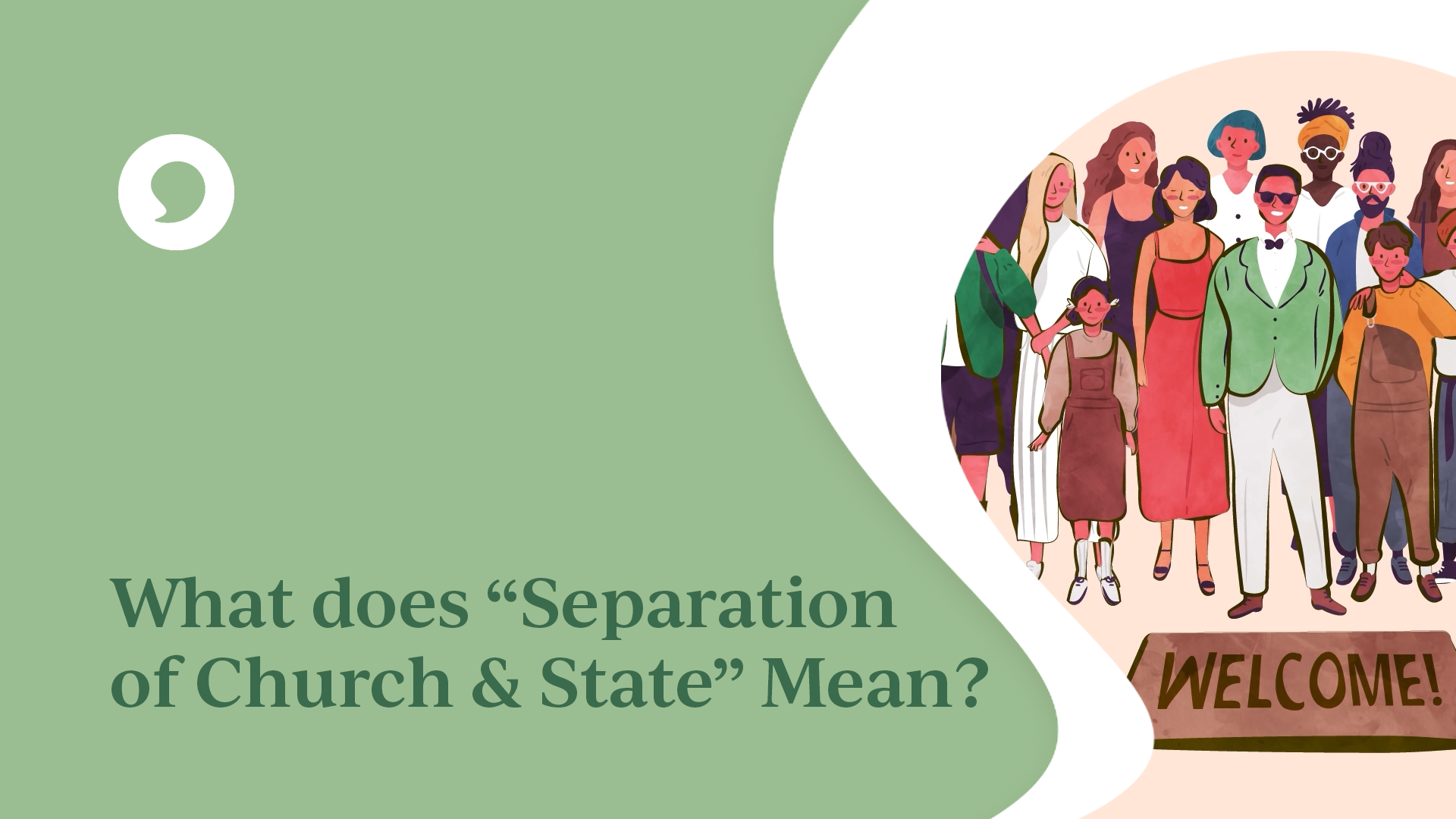You’re in a conversation, and someone throws around the term “Christian nationalism.”
What would you say?
Depending on who is describing it, Christian nationalism is what American Christians have always believed, or something new and sinister that threatens to undermine the Constitution and misrepresents the Gospel.
There are few terms that are more readily used but less defined than “Christian nationalism.”
But what does "Christian Nationalism" REALLY mean?
What Is Christian Nationalism?
You’re in a conversation, and someone throws around the term “Christian nationalism.” Maybe they're claiming to be a Christian nationalist, or maybe they're accusing someone else of being a Christian nationalist. What would you say?
Depending on who is describing it, Christian nationalism is what American Christians have always believed, or something new and sinister that threatens to undermine the Constitution and misrepresents the Gospel. Some think it is a danger to the freedoms of non-Christians, while others claim it is the only way to protect the freedom of Christians.
There are few terms that are more readily used but less defined than “Christian nationalism.”
The next time you hear someone throw around the term “Christian nationalism,” remember these three things:
First, the term “Christian nationalism” must be defined.
The biggest problem with “Christian nationalism” is that no one seems to agree on what the term means. The Oxford Languages’ dictionary defines “nationalism” as “identification with one’s own nation and support for its interests, especially to the exclusion or detriment of the interests of other nations.” However, this definition was shaped in response to the various nationalist movements of the 20th century, many of which sparked world wars, ethnic cleansing, and genocides.
But nationalism can mean something far less scary. For instance, one of The American Heritage Dictionary’s definitions for “nationalism” is “the belief that a particular culture or ethnic group constitutes a distinct people deserving of political self-determination.” In other words, nations exist and should govern themselves. That’s not controversial at all.
The term becomes especially confusing when the word “Christian” is added. This could refer to a nationalist who happens to be a Christian, someone who thinks there should be an established church, or someone who thinks non-Christians should be punished or excluded from full participation.
You see the problem. This is why we must insist that people define their terms, rather than assume that everyone knows what they mean by “Christian nationalist.”
Simply ask, “What do you mean by that?” And then follow up with clarifying questions.
Second, much of what is called Christian nationalism is not Christian nationalism.
Especially in recent years, “Christian nationalism” has become a generic term of abuse hurled by the political Left at Christians who believe faith and morality are relevant to politics. Progressives who once called political opponents “Nazis” or “fascists” or “racists” now often call people “Christian nationalists” instead.
But often, what the Left calls “Christian nationalism” is just old-fashioned Christian patriotism. For instance, recognizing that the American founding was grounded in certain biblical principles (which it was!) can elicit the accusation of Christian nationalism. Or pointing out the outsized role that the Christian religion has played in American history (which it has!) or believing that Christians should have a voice in government (which they should!) and a duty to vote and legislate according to Christian values (which they do!). One reporter announced that the belief that our rights come from God is Christian nationalism, and many have said that being pro-life is Christian nationalism.
Even beliefs once considered commonsense have now been re-labeled as “Christian nationalism,” for example, that marriage is exclusively between a man and a woman. Today, this definition of marriage is deemed “religious.” Were the secular Americans in the past who rejected so-called gay “marriage” Christian nationalists? Of course not.
None of these beliefs make someone a Christian nationalist. They just mean that someone is a politically-involved Christian. John Jay, the first chief justice of the U.S. Supreme Court, once wrote:
Providence has given to our people the choice of their rulers, and it is the duty, as well as the privilege and interest, of our Christian nation to select and prefer Christians for their rulers.
Was John Jay a Christian nationalist?
Martin Luther King Jr. often quoted Scripture to argue for his political goals and claimed that our rights come from God.
Was Martin Luther King Jr. a Christian nationalist?
The fact is, Christians in the United States have always brought faith into politics, always prayed for the nation as the Bible instructs, always advocated for godly and just laws, and always sought to elect fellow Christians to government offices. None of this makes citizens who take their faith seriously “Christian nationalists.”
Third, some ideas that go by the name “Christian nationalism” are dangerous and un-Christian.
Unlike Israel or England or Japan or dozens of other nations, America has never been defined by a single ethnicity or culture. The type of nationalism that has long marred our country’s history is white nationalism, the belief that only white-skinned or Anglo-Americans really belong here and should be in charge. Groups like the Ku Klux Klan have at times appropriated Christian imagery like the cross to advance racist ideology and terrorize black Americans and other racial minorities. Because of this, the term “Christian nationalism” has functioned as a cover for white nationalism.
In a similar way, other nationalist movements of the 20th century in other countries were deeply racist. In some of these countries, this hatred led to violence, including some of the worst genocides and ethnic cleansing campaigns in human history. Some of these movements also claimed to be Christian movements. In light of this history, people should be suspicious when they hear “nationalist” language today, even if the person using it means well, and even if it’s attached to the term “Christian.”
Particularly in a time when the internet has sparked a resurgence in Right-wing ideologies with racial overtones, it’s unwise to assume just because someone calls themselves a “Christian nationalist” that their politics are Christ-like. The history of this term, together with its ambiguity, means that it often obscures more than it reveals. And what it obscures is often far from Christian.
To summarize, the next time someone throws around the term “Christian nationalism,” remember these three things:
First, Christian nationalism must be defined.
Second, much of what is called Christian nationalism is not Christian nationalism.
Third, some ideas that go by the name “Christian nationalism” are dangerous and un-Christian.
Referenced Resources:
Definitions of "nationalism":
https://www.google.com/search?q=nationalism
https://ahdictionary.com/word/search.html?q=nationalism
Additional Resource:



 What Would You Say?
What Would You Say?


